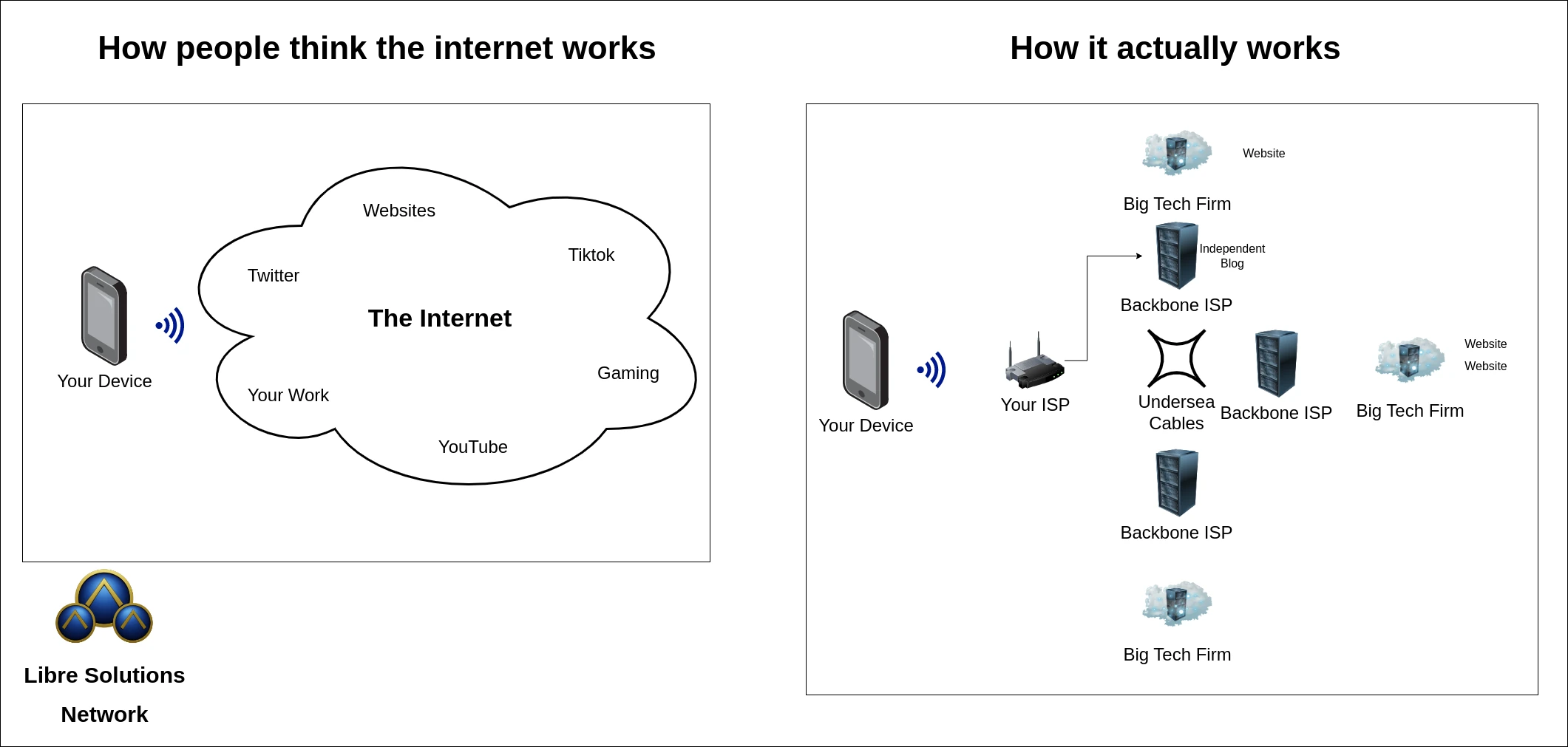It is important to remember that when it comes to free expression online, no corporation is coming to save you. For far too long, people have placed too much trust in corporate social media. They have certainly abused that trust, but as of recently a far more concerning trend has arisen: parts of the Internet de-platforming itself.
ipv6 prefix-list ipv6-prefix-filter-as400304
seq 950 deny 2607:46c0::/32 le 48
Archive
It doesn’t look like much, this innocuous text reveals that the Internet isn’t dying… it’s being killed. It’s not so much the what here that’s important, but the why that matters a great deal here. For now, what’s important to understand is that the Internet is built very differently from how most people imagine it.
The internet isn’t a single homogeneous network, it’s a network of networks. Those networks need a protocol to negotiate a vast array of details, to successfully and efficiently move data around. In many ways, it’s somewhat of a miracle it all works at all.
Naturally, there are weak-points that get tested over time. In our age of incredibly high polarization, people may choose to take incredibly rash actions even if there are immensely harmful consequences to vital structures. In a way, I am conflicted to point this out, because if more mobs of people decided to selectively pressure ISPs to wage the culture war for them, it is effectively game-over for the Internet as a meaningful tool for free expression, cultural exchange, and the preservation of knowledge.
Unfortunately, we do not have the luxury of wishing the cat back into the bag. This is a one-way trip into a world where this is a risk people need to properly account for. In recent times, we have seen just how motivated governments and corporations across he world are to secure total dominance over online communications and commerce, it would be a mistake to idly stand by while politicized mobs secure a veto over critical infrastructure.
What happened
- Joshua Moon runs a controversial online forum Kiwi Farms, which is the target of extreme and escalating online censorship.
- Hurricane Electric has blocked network traffic from IPs associated owned by Joshua Moon, impacting IngocNet’s services in Washington.
- Washington has common carrier protections for communications online.
It is up to their attorney general, to enforce those protections. - IncogNet LLC has filed a complaint to the washington attorney general against hurricane electric for de-platforming their IPs.
If you’d like to hear the situation broken down by Joshua himself, you can listen to this episode of the Heterodorx podcast.
Technical Background
Internet service providers (ISPs) have to connect to each other for this whole internet thing to work. One mechanism that helps with this is BGP (Border gateway protocol), which is how networks introduce themselves to each other. This connection between ISP networks is a fundamental unit of the Internet. Without it, you’d need to have a direct, physical connection to every service you want to use.
BGP is a big deal, despite being something very few people have to interact with directly. Causing problems with it made the Internet unusable for half of Canada last year. It’s a trivial change to block a particular network, which is done to mitigate direct attacks on the network or criminal activity. The weaponization of this is an immense challenge for anyone who cares about a free and open internet.
Not all ISPs are equal, anyone with the capability of applying pressure to critical components on “the stack” has the ability to have immense power over anyone’s ability to participate online.
The only reason we’re hearing about this at all, is because of how dedicated Joshua Moon has been about keeping his website online. In the face of being de-platformed by multiple providers, many other projects would have merely given up. How many businesses or publication would persist after being de-platformed by ISPs and hosting providers all over the world?
What makes this incident personally interesting to me is that this is a window into the bleeding-edge of censorship online. I doubt that the Internet itself is resilient to sustain politically motivated attacks at such a fundamental level. This incident forces all of us to consider how the world would be different if access to the Internet was only possible with permission and control of unaccountable public-private partnerships.
Why this matters
As cited in Tools of the Technocracy: Internet Shutdowns:
In a deeply troubling response, after both terminations we saw a dramatic increase in authoritarian regimes attempting to have us terminate security services for human rights organizations — often citing the language from our own justification back to us.
Said succinctly, the slope is indeed very slippery and very steep.
It’s difficult to overstate what this means for the future of the Internet. No site, service, or community can single-handedly withstand the forces at play here. The very same tactics used to shut down that forum, can and will be leveraged against anything. This means that even if the forum is successful at staying online, a strategy has been introduced that can be attempted at a different time, with a different pretext, on any target.
In the United States, you have today created a law, the Telecommunications Reform Act, which repudiates your own Constitution and insults the dreams of Jefferson, Washington, Mill, Madison, DeToqueville, and Brandeis. These dreams must now be born anew in us.
You are terrified of your own children, since they are natives in a world where you will always be immigrants. Because you fear them, you entrust your bureaucracies with the parental responsibilities you are too cowardly to confront yourselves. In our world, all the sentiments and expressions of humanity, from the debasing to the angelic, are parts of a seamless whole, the global conversation of bits. We cannot separate the air that chokes from the air upon which wings beat.
In China, Germany, France, Russia, Singapore, Italy and the United States, you are trying to ward off the virus of liberty by erecting guard posts at the frontiers of Cyberspace.
A Declaration of the Independence of Cyberspace
By John Perry Barlow
What you can do
Joshua Moon himself suggests that you:
- Learn how to acquire & use Cryptocurrency if you’re interested in supporting those who are de-banked.
- Learn how to use Tor, to access information that may be entirely removed from the “clearnet”.
- Support expanding common carrier protections for speech online.
A call to stand up for individual rights
You don’t even have to like the forum to recognize that escalating top-down control over the Internet is a net-detriment for all our liberty. The feedback loop of people leveraging institutions to abuse their opponents only further escalates the cycle.
You need to start deciding what measures are “too far” even for those you disagree with the most. It is critical that we as people in society strengthen the restraints on how institutions are able to interact with people. Given how fundamental the Internet is with commerce and people’s lives, it’s vital that we reassert people’s human liberties in cyberspace as well.
Non-Solutions
Tor alone
Relegating free and open expression to a small minority of technologically savvy dissidents is all-but a win condition for tyrants. Tor is an incredibly useful tool, and it is critical that people understand how to use it and other privacy networks, but it is not a complete solution. Any single tool that can be used for dissent can itself become a target.
While it’s one thing to access the Tor network, it’s a whole other challenge to attempt to hide that you’re using it. If we allow ISPs to be weaponized against their customers, and the Internet itself, there is very little that can be done to route around it.
Web3 Fixes this!
Building on he previous section, we cannot out-engineer a culture that tolerates, much less demands censorship. Due to the very way the Internet works, this problem can’t be fixed with merely a different coat of paint on top. There are fundamental structural realities that higher level applications can’t solve.
This is because the physical state of the network is downstream of real physical realities and economies of scale. It would be much easier to reaffirm individual rights, than to try to bet everything on engineering a perfect global network without compromise.
How to normalize institutional abuse
There is a pattern where further and further excesses are justified in the name of persecuting the worst of the worst, yet they manage to be generalized to all of society like the Zero Covid Policy or the War on Terror. It wasn’t long after Alex Jones was de-platformed that governments across the world were coordinating to control social media entirely.
1. Find an unsympathetic target
By selecting a target that’s difficult to defend, people will very often ask “Is this the hill to die on?”. By procrastinating to defend people’s right to due process or from unreasonable sanctions, we enable further abuses. The target isn’t selected for their suitability towards the intended policy goal, but rather because they are unsympathetic.
2. Target them with a dedicated smear campaign
I would caution you to not dismiss that you yourself may very well be such a target. None of us are without sin, and almost everyone can be fit to be tied in our age of algorithmically enhanced outrage and polarization. It’s very easy to find a couple of points about anyone, that someone can find a non-trivial amount of people dislike.
This is the real danger of our polarized times. People are unwilling to stand for other’s inalienable natural rights, and instead prefer to only stick out for their perceived allies in the culture wars. This means that nobody is truly above being tarred and feathered by a highly motivated group of activists.
Note: Nothing has to be fabricated. People are naturally quite different and there are going to be real and meaningful disagreements. It is our responsibility to ensure those disagreements are handled properly and fairly, rather than wage culture war with the justice in the balance.
3. Shut down or shut out the target without any due process or means to appeal on factual grounds
Again, ironically it’s not really about the target, it’s about the power to be seized from an opportunity. There are all kinds of means to burden a target with fines, reputational harm, or even violence without providing a fair an impartial hearing. In fact, even a guilty target being convicted would be counter-productive, because the goal is to use the perceived injustice to justify further excesses.
4. Broaden the scope of targets
As the target is removed from play it doesn’t matter anymore who is on what side anymore. You can now use that incident as a precedent justify the same action on unrelated targets. Instead of addressing matters on their merits, instead you can smear critics as being accomplices of the target, or just as profane. With the mechanism in place, people who gain from exploiting it will be motivated to keep the narrative in place, and to continue to silence those who speak out against it.
The road to serfdom
Let’s pretend for a moment that we will fully intend to use this power for the benefit of all. Despite mainstream social media giants being unable to fully eliminate criminal activity of their networks, we’re going to deputize ISPs to police every interaction online.
With means like online identity verification, criminals and deplorables alike will be able to be entirely purged from the Internet merely at the cost of an increasingly powerful bureaucracy monitoring, blocking, or altering people’s communications. The process itself becomes the problem. Instead of actually resolving the problem we have merely concentrated more power into a more consolidated structure that becomes ripe for abuse.


